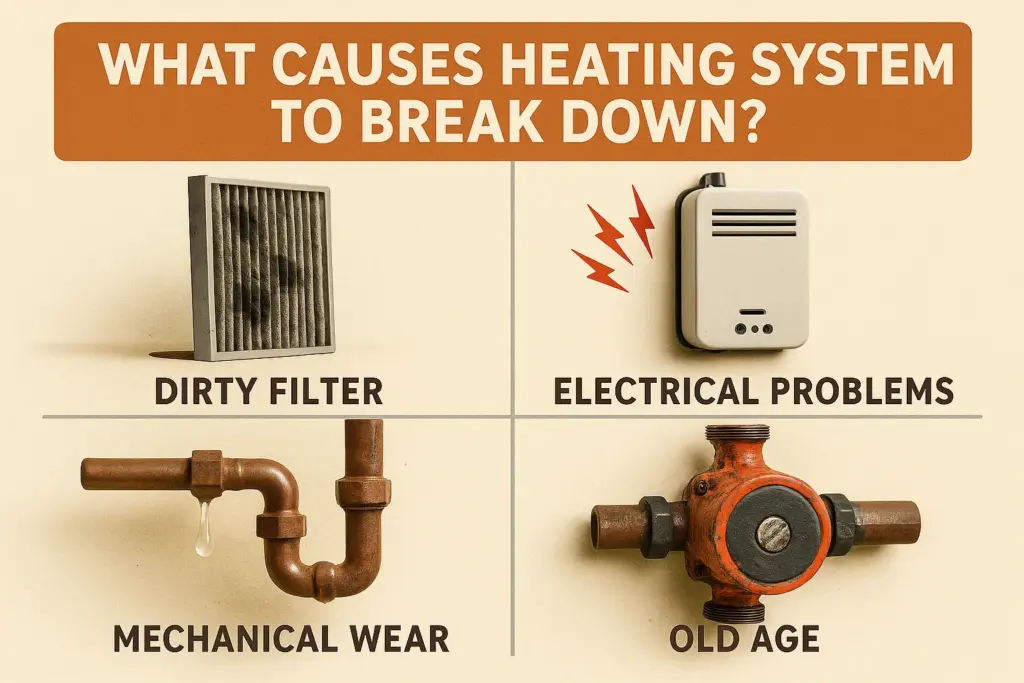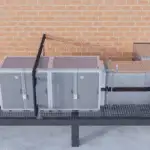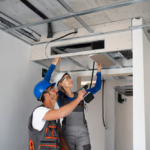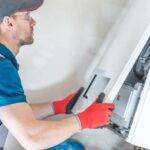When it gets cold, a working heating system is essential for a cozy home. But, have you ever thought about why your heating system stops working when you need it most?
Knowing the common issues that cause heating system failure helps prevent breakdowns. It also ensures your system works well all year.
By finding out why heating systems fail, you can keep yours running smoothly. This way, you can avoid expensive repairs.
Key Takeaways
- Regular maintenance is key to avoiding heating system breakdowns.
- Common problems include old parts and bad installation.
- Understanding failure causes lets you act early.
- Good maintenance can make your heating system last longer.
- Spotting issues early can save you from expensive fixes.
Common Causes of Heating System Failures
Many issues can cause heating system failures. Knowing these can help homeowners keep their systems running well. Taking steps early can ensure your heating works all year.
Age and Natural Wear
Heating systems, like all machines, have a lifespan. Parts wear out, and efficiency drops over time. Regular checks can spot worn parts for timely replacement. A well-kept system can last 15 to 30 years, depending on its quality.
Poor Maintenance Practices
Ignoring maintenance invites problems. Dirty filters, clogged ducts, and corroded parts hurt efficiency and shorten lifespan. To prevent this, remember to:
- Change filters often
- Clean ducts and vents
- Look for corrosion or wear signs
Electrical Issues and Power Problems
Electrical problems often cause heating failures. Bad wiring, tripped breakers, or blown fuses can stop your system. Power surges can also damage parts, leading to expensive fixes. To avoid these, install surge protectors and check your electrical setup.
Knowing why heating systems fail helps prevent issues. Regular upkeep, quick fixes, and watching system age can keep it running smoothly.
What Causes Heating Systems to Break Down Unexpectedly?
It’s important to know why heating systems fail without warning. Many things can go wrong, from thermostat problems to fuel issues.
Thermostat Malfunctions
A bad thermostat can cause heating systems to fail. If it doesn’t talk to the system right, it might not work. Make sure your thermostat is set right and change the batteries when needed.
Ignition and Pilot Light Problems
Problems with the ignition or pilot light are common too. If these parts don’t work right, your system won’t heat. Keep them clean and check them often.
Fuel Supply and Delivery Issues
Fuel problems can also stop your system. This includes running out of fuel or delivery issues. Check your fuel levels and the delivery system to avoid these problems.
| Cause | Description | Potential Solution |
| Thermostat Malfunction | Failure to communicate with heating system | Check thermostat settings and batteries |
| Ignition/Pilot Light Issues | Faulty ignition or improper pilot light burning | Inspect and clean ignition and pilot light components |
| Fuel Supply Issues | Running out of fuel or delivery problems | Check fuel levels and inspect delivery system |
Knowing these causes helps homeowners stop heating system failures. They can keep their systems working well all winter.
System-Specific Breakdown Causes
Heating systems, like furnaces, heat pumps, or boilers, have unique failure points. Knowing these can help you keep your system running smoothly. It also helps you fix problems quickly.
Furnace-Related Problems
Furnaces are a common heating choice but face specific issues. Clogged air filters and faulty ignitions are common problems. Regular maintenance, like cleaning or replacing filters, can prevent these.
Also, make sure the furnace fits your home’s size and electrical connections are secure. This reduces breakdown risks.
The heat exchanger’s condition is also key. A cracked heat exchanger can be dangerous, leading to carbon monoxide leaks. A professional should check it regularly to catch problems early.
Heat Pump Failure Points
Heat pumps are efficient but can fail in certain ways. Refrigerant leaks are a big concern. They make the system work harder, raising energy costs and risking failure. Regular checks and keeping refrigerant levels right help keep efficiency.
Another issue is the reversal valve. If it fails, the system blows cold air instead of warm. Quick maintenance and issue fixes can prevent this.
Boiler System Complications
Boilers are reliable but can face problems like corrosion and scale buildup. These can cause leaks and lower efficiency. Regular maintenance, like checking for corrosion and cleaning, can help avoid these issues.
It’s also important to ensure the boiler is the right size for your home. A faulty pressure relief valve can also cause safety issues and system failures. Make sure it’s working right.
Warning Signs Your Heating System Is Failing
Knowing the signs of heating system failure is key. Your heating system keeps your home cozy, which is vital in cold weather. Spotting early signs can stop big problems and keep your system running well.
Unusual Noises and Odors
Listen for unusual noises or unpleasant odors from your heating system. Sounds like clanking or banging mean there’s a mechanical problem. A burning smell or musty odor also warn of issues.
Don’t ignore these signs. They often hint at bigger problems.
Inconsistent Heating and Cold Spots
Inconsistent heating and cold spots in your home are red flags. If some rooms are warmer than others, or areas don’t heat up, it’s a sign of trouble. This could be due to ductwork issues, thermostat problems, or a failing heating element.
Rising Energy Bills and Reduced Efficiency
See a big jump in your energy bills without using more? It might mean your heating system is losing efficiency. As systems age or aren’t maintained, they use more energy. Regular upkeep and timely fixes can help, but old systems might need replacing.
Stay alert to these warning signs to fix problems early. Following heating system maintenance tips can also prevent failures and keep your system efficient.
Preventative Maintenance to Avoid Breakdowns
To avoid heating system breakdowns, you need to be proactive with maintenance. Regular maintenance tasks can greatly reduce the chance of your heating system failing when you need it most.
Seasonal Maintenance Checklist
A seasonal maintenance checklist is key to keeping your heating system running smoothly all year. Here are some important tasks to remember:
- Before winter, inspect and clean your heating system, including the furnace, ducts, and vents.
- Check your thermostat to ensure it’s working correctly and consider upgrading to a smart thermostat for better control.
- Inspect your heating system’s electrical connections and components for signs of wear or damage.
- Test your heating system’s safety controls, such as the carbon monoxide detector.
Filter Replacement and Cleaning Schedule
Regularly replacing and cleaning your filters is essential for your heating system’s efficiency and longevity. Here’s a basic guide:
| Filter Type | Replacement Interval | Cleaning Frequency |
| Fiberglass | Every 1-3 months | Monthly inspection |
| Pleated | Every 3-6 months | Every 2 months |
| HEPA | Every 6-12 months | Not recommended to clean |
Professional Inspection Benefits and Frequency
Professional inspections are critical for catching issues early. It’s wise to have a professional check your heating system annually. The benefits include:
- Early detection of problems, reducing the risk of breakdowns.
- Improved efficiency, which can lower your energy bills.
- Extending the life of your heating system through proper care.
By following these preventative maintenance tips, you can enjoy a warmer, more comfortable home. Plus, you’ll avoid the high cost of repairs.
DIY Troubleshooting for Common Heating Problems
Fixing your heating system can seem hard, but it’s easier than you think. Just follow a few simple steps to solve common problems.
Basic Safety Precautions Before You Start
First, make sure you’re safe. Turn off the power to your heating system at the circuit breaker or fuse box. Never work on electrical or gas components without proper shutdown. Also, check your system’s manual for safety tips.
- Turn off the power to the heating system.
- Allow the system to cool down if it was recently in operation.
- Use proper lighting to inspect the area around the heating system.
Simple Fixes Anyone Can Perform
Some heating system issues have easy fixes. Here are a couple of common problems and their solutions:
Thermostat Checks and Resets
A bad thermostat can cause heating problems. Try resetting it or replacing the batteries if it’s battery-powered. Make sure it’s set to “heat” mode and the right temperature.
- Check the thermostat’s temperature setting.
- Ensure it’s set to “heat” mode.
- Try resetting or replacing batteries as needed.
Air Filter Inspection and Replacement
A dirty or clogged air filter can make your heating system work poorly. Regularly checking and replacing the air filter is a simple yet effective maintenance task.
- Locate the air filter according to your system’s manual.
- Inspect it for dirt or debris.
- Replace it with a new filter if necessary.
When to Stop and Call a Professional
While DIY troubleshooting can solve some problems, there are times to call a pro. If you’re unsure or the problem doesn’t go away, get expert help. Complex issues, such as those involving gas lines or electrical components, should always be handled by a qualified technician.
“If you’re not sure what’s wrong with your heating system, it’s always better to err on the side of caution and consult a professional to avoid possible risks or further damage.”
Conclusion
Knowing why heating systems fail is key to avoiding breakdowns. By understanding common failure causes, you can keep your system running well. This ensures it works efficiently.
Regular maintenance is essential to avoid breakdowns. Following the tips in this article helps spot issues early. This saves you from expensive repairs and keeps your home warm.
To keep your heating system in top shape, tackle common failure reasons. This includes worn parts, neglect, and electrical problems. Doing so ensures your system works well all winter.
FAQ
What are the most common causes of heating system breakdowns?
Heating system breakdowns often happen due to age and wear. Poor maintenance and electrical issues also play a big role. Thermostat problems, ignition issues, and fuel delivery problems are other common causes.
How can I prevent my heating system from breaking down unexpectedly?
To avoid unexpected breakdowns, keep up with regular maintenance. Check your system seasonally and replace filters when needed. Fix any problems right away.Make sure your thermostat works well. Look for any signs of wear or damage.
What are the warning signs that my heating system is failing?
Signs of a failing heating system include odd noises and smells. You might notice uneven heating or cold spots. High energy bills and reduced efficiency are also warning signs.If you see these signs, fix the problem quickly to avoid a full breakdown.
How often should I have my heating system professionally inspected?
Get your heating system checked by a pro at least once a year. Do this before the heating season starts. This helps catch problems early and keeps your system running well.
Can I perform DIY troubleshooting for common heating problems?
Yes, you can try DIY fixes for some heating issues. Check your thermostat and air filters. Make sure fuel supply is okay.But always be careful and know when to call a pro. If you’re unsure or uncomfortable, it’s best to seek help.
What are some simple fixes I can perform to resolve heating system issues?
Simple fixes include resetting your thermostat and changing air filters. Check for blockages or damage in the system.These fixes can often solve minor problems and get your system working again.
How can I maintain my heating system’s efficiency and prolong its lifespan?
To keep your heating system efficient and long-lasting, do regular maintenance. Replace filters as needed and fix problems quickly.Consider using a programmable thermostat. Also, ensure good insulation and duct sealing.




